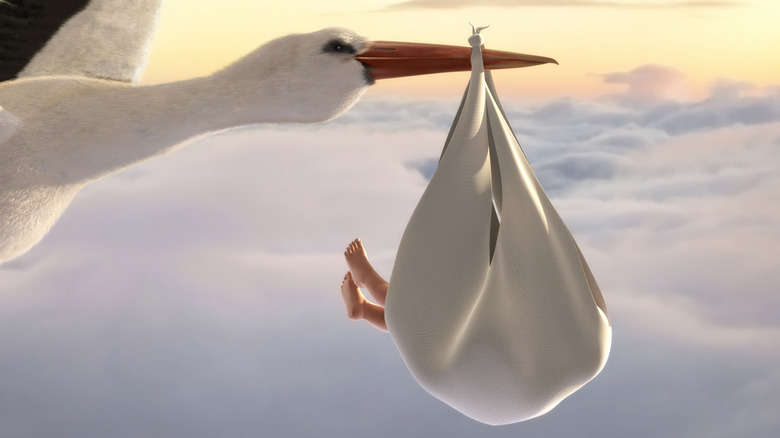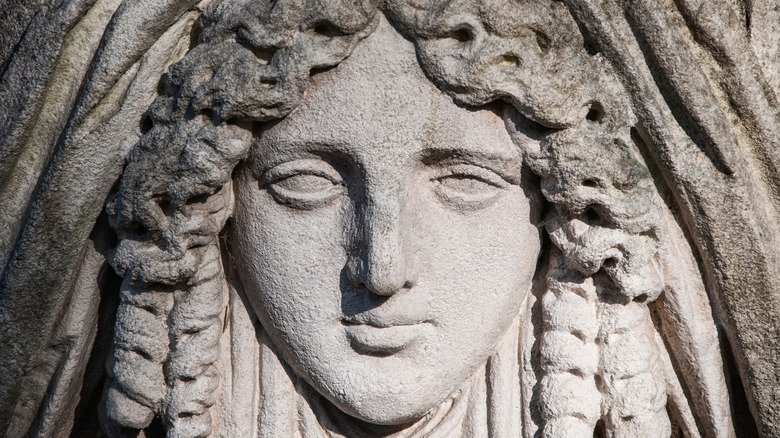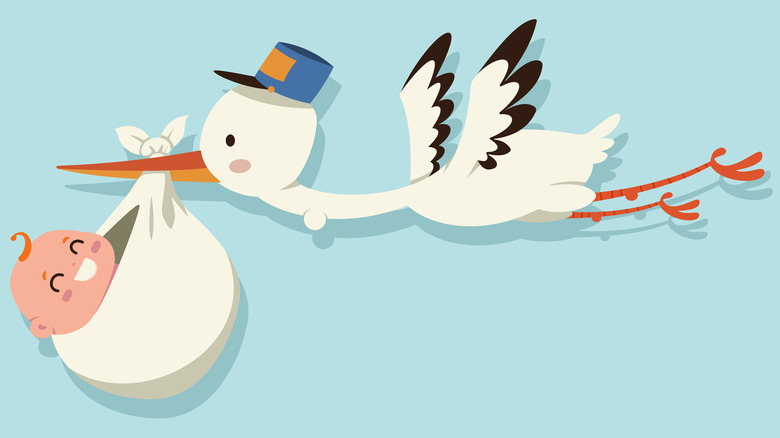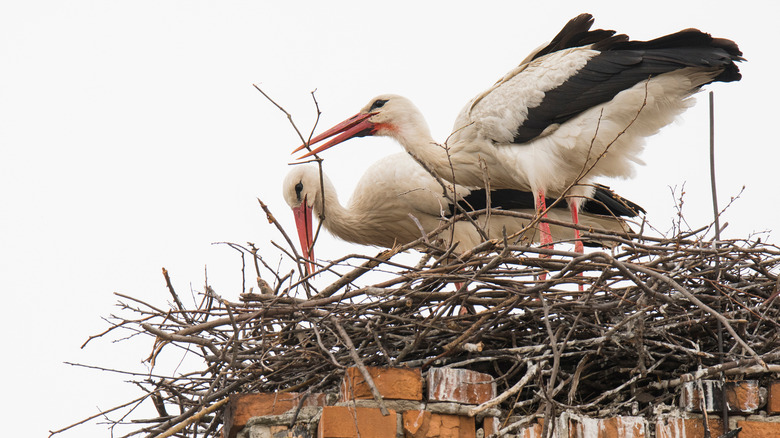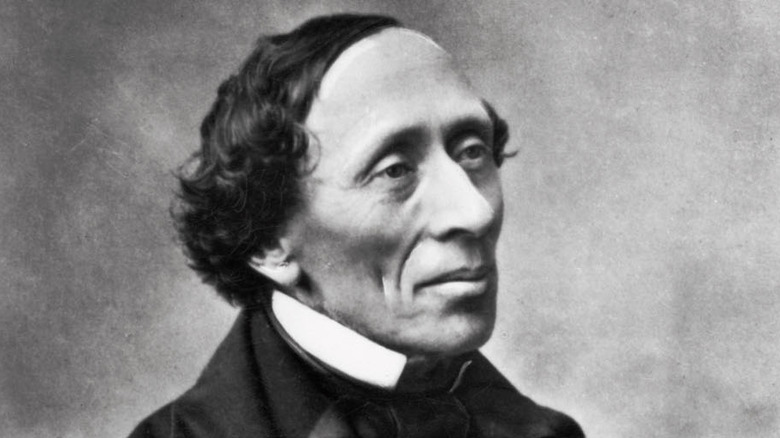Where Does The Myth Of Storks Delivering Babies Come From?
Storks have been delivering babies for centuries, and not just in the U.S. — or so the story goes. The legend of the baby-delivering stork spans many countries around the world and goes back many years. And while other very unusual baby-delivering methods — like babies delivered by mailmen – are actually true, we know birds have better things to do than travel around the world with newborn humans.
So where does this cute story come from? The delivery of babies "via stork" is actually a near-universal story that sounds very similar no matter where you are. In most cases, the storks use their beaks to carry babies wrapped in a cloth sack, flying to the home of expecting parents to drop off the newborn. In some countries, they leave babies on the doorstep of their new home. In other countries, they're dropped down the chimney (via The Bird Spot).
And how exactly do the storks know where to drop off the babies? According to folklore, you could leave sweets on the windowsill to indicate you wanted a baby, and the stork would stop by at some point with one. If you already had children, you could also ask them to sing to the storks, asking for a sibling.
Ancient myths of babies and storks
One of the oldest, most specific myths involving storks and babies goes back to the Greeks. According to the story, goddess Hera was extremely jealous of Queen Gerena. Some versions say it was because Gerena was so beautiful, while other stories say it's because the queen was having an affair with the god Zeus, Hera's husband, and Hera was ready for revenge (per History Daily). In the end, Hera transformed Gerena into a stork so she would fly away. Gerena had a baby, perhaps fathered by Zeus, and before the queen departed she grabbed her baby and carried him off with her. Stork flying with a baby hanging from her beak?
However, author Rachel Warren Chadd in the 2016 book "Birds: Myth, Lore and Legend" says the bird in the myth was most likely a crane rather than a stork, but even that is hard to confirm as in ancient times, "storks, cranes and herons were often confused" (as reported via Live Science).
The Greeks weren't the only ones with stork mythologies connected to babies, however. The ancient Egyptians used a stork to represent the soul (known as ba). So when a stork appeared after somebody's death, it meant that person's soul was about to be reincarnated, coming back as a new baby, according to Today I Found Out.
Other stork myths around the world
Storks have often been associated with positive things around the world. According to History Daily, they represent purity in the Middle East, family in ancient Europe, and good fortune and fertility in many Native American cultures. They also appear in Asian myths and stories, always representing positive things. In Japan, storks, or kounotori, are supposed to bring happiness (per JA-tajima).
Some of the European roots of the myth trace back to Germany, but they aren't the only ones (via Today I Found Out). According to Ornithology, Slavic culture and mythology also tell of storks carrying unborn souls back from the realm of the dead — specifically, from Vyraj, a place for the souls to rest until they come back and where storks go during wintertime.
In Medieval Germany, however, the myth of baby-carrying storks became a lot more specific. Back then, according to a myth reported via Birdspot, the storks would travel to caves or marshes to find adeborsteine (literally, "stork-stones"). These stones were supposed to be the souls of unborn children, which could be picked up by storks and delivered to expectant parents. You could always tell if you were being given a child who was either naughty or nice by the way the stork would carry them: Nice newborns would ride on the stork's back, but naughty children would be carried hanging from the stork's beak.
So why storks?
Why are so many countries and cultures around the world choosing the same bird for "baby deliveries"? What makes storks so special that they have become so connected to the idea of bringing new life into the world?
Part of this might relate to some of the storks' natural behaviors. For example, in medieval times, pagans used to favor the time around the summer solstice for marriage because, according to LiveScience, this was a time that was supposed to be fertile, so it augured good things for the couple. This was also the time when storks would start to head south so they could spend winter in Africa before they returned the next spring, about nine months later. According to Rachel Warren Chadd, these would be about the "same time that a lot of babies were born" (as reported via Live Science).
Storks are also good parents themselves, spending most of their lives with the same partner and sticking around to help raise the babies. Both parents build the nest together, then take turns incubating the eggs and feeding the young until they're ready to leave the nest (per Fort Wayne Children's Zoo). Finally, storks are one species of bird that doesn't seem to be bothered by the presence of humans and will seek out settlements to build nests on chimneys and rooftops. It makes sense they would be connected to childbirth and helping humans, as History Daily points out.
Modern myths and stories
The most modern twist to the story came in 1839, when Danish author Hans Christian Andersen (above) published a story called "The Storks," according to Live Science. A dark tale about the consequences of being naughty, the story goes that after a group of children tease and throw stones at the storks, the birds decide to teach them a lesson. To do that, they deliver a dead baby to the bratty children and happy healthy babies to the nice boy who stood up for the birds (per History Daily).
According to the tale, the dead baby — found in a pond "where all the little human babies lie until the storks come to take them to their parents" — had "dreamed itself to death." And while usually these babies would remain in the pond forever, the storks decided to deliver him anyway as a cautionary tale to what happens when you misbehave (via The Hans Christian Andersen Centre). A bit of a harsh and morbid lesson, but one that ended up cementing the role of storks in delivering babies in modern times. And since Victorian England was a time when speaking about babies, sex, and births was a major taboo, the storks became an easy way to explain where babies came from when curious children started to ask questions (via Live Science).
